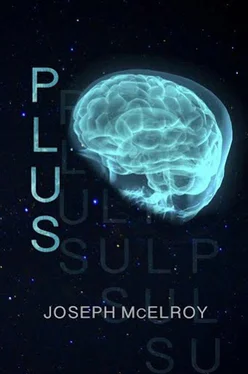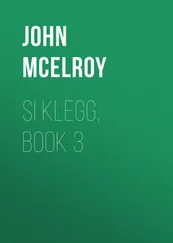No hands, no elbows, no instep, no neck, no tail, no spleen, sweat, pancreas, nor amid the cells of the pancreas those ductless insulin-creating Islets of Langerhans. And would there be no blind spot where retina gives optic nerve entry or exit or a living chance?
What then would Imp Plus do?
Monitor an echo. An echo that went on communicating knowns by knowns. For here again was the Dim Echo reporting synchronized cultures not now synchronized, reading down to Ground figures to match Ground’s. Readings for nitrogen reaction in the nutrient test and for the lively swing of glucose levels. Dilatometer — he knew dilate —readings for liquid expansion. Galvanometer readings for activity in chlorella populations and in the cortical surface.
Ground said to say again how low glucose had gone before rising to a new but short-lived high. Ground said to check chlorella cultures again, they should still be synchronized. Ground said, SAY AGAIN PLEASE TRANSMISSION TOO FAST TOO DIM HARD TO TELL WHICH, and the dim but near Dim Echo went on so with the glucose ups and downs that the Dim Echo did not hear Ground’s request to go slower.
But when Imp Plus heard Ground now report electrical activity in prefrontal areas 9 and 12, then come between its own areas to ask if in the prefrontal lobe the Dim Echo (here called IMP PLUS) was giving back some of the kicks it had been getting from Ground in the temporal lobe — and by the way, said Ground, what pleasure did he feel in 9 and 12 right now? — Imp Plus did not have to hear out the Dim Echo’s unfolding reply about like patterns of activity surfacing—50 % pleasure, 50 % not — lobe-source sensors now hard to tell apart.
For Imp Plus found in all the folds whose fibers gripped each lens of those eyes he had held with his own lost eyes a sweet humor of sugar and blood which unfolding flowed over him.
It was a fluid ground laid down upon furrows, fissures, ridges, rolls.
It flowed over Imp Plus’s body, except he had no body now. Flowed onto folds that were his as surely as one of them now parted to make him glimpse what he had not known he wanted to see.
And this thing he saw was hers. Or must be hers, because the nourishing smell was that smell from her eyes. That slow serum mulled of sweet color and grains or globes of infant meal.
But then the smell faded as if turned down by an alien pulse at a distance. Yet the smell went like a trace that will come back. And what Imp Plus saw was a fine tangle of light veined against a fine darkness. Veins fixed as a map but everywhere winking.
This too was fading, but by increase: that is, blurring brighter and brighter. Like the light Imp Plus had wished for during a dark cycle where there was no good Sun. The bright blur was from the tangle of light and was one of the veins and he was closing fast on it like one of the smaller and smaller pieces his lost body had divided into as if in order to privately weigh itself.
Imp Plus went in. He passed through the brightness. And the Dim Echo was heard to have long finished responding that these nerves in the iris of that eye stood out upon their dark membrane because of the transmitter substance noradrenalin fluorescing in the neurons.
But the dark into which Imp Plus went through the vein of bright blur could not be her dark. True, the field of aqueous humor had been hers. For it came from folds where fibers guyed the lenses of her eyes. It flowed and singled out and filled and opened the new fold among the fissures and ridges. But like the fissures and ridges and cols and rolls that were his, this new fold was also his. It was part of all that the serum of sweet particles had spread its field upon.
Which was body. And was his. Yet not his body. Most of which was gone. And so could not react.
The smell of her eyes at the seashore was gone now too and gone the trace net of iris nerve light through which Imp Plus had passed into a dark he now heard caving toward him.
A dark which was his, he knew.
Because in what was his.
Which was one fold of many folds, many cols, clefts, fissures.
The dark was his because it was breaking. It caved and broke into parts he found he had wanted. But here was a breakage so great his cells for hearing it broke too; and his cells for seeing it were eyes jammed into sockets till the sacs split and aqueous humor spilled; so the eyes would stay sunk, which was what happened in a thing he now knew he had prepared not to remember but remembered just the same though not the word for it. It was like a thing he had been feeling that was here too. It he could not get the word for either. He knew only that it asked. Beyond this thing he had been feeling, he found out what was in turn beyond the words for what he did find. The cells for hearing and seeing the breaking were other than the breaking itself. The breakage was as soft as glue. A gluey unit lapsing into many units of sponge which then became many, many more and then became glue units, again. But ten to one it was glue. Ten glue to one gray. But the glue should be white, and this was darker. And there was a deep crackling unheard as if forestalled.
He wanted the word for the thing he’d been feeling: the word that was more a question. He wanted to stop, please. But now found that upon the dark he himself could place and place again what had faded or been turned off: the sweet smell and the nerves full of light. So there they were again, recalled here. He thought it was a thing he could do, and without words. Which was not the other thing that he’d felt and that was a word that was more a question.
But now from the center out the breaking dark was breaking up.
Into more and more corners, but reversed to point in at the growing center from which all the corners slid away like a star of darkness turned outside in, in angles. And the parting dark took away with it the iris nerve nets he had made reappear, and took away the sweet smell of her eyes at the shore.
Since he could not stop, and could not stop wanting, and could not place the word for the thing he had felt here which made him want to stop, he wanted then to be not here. But what caved up out of the cracked dark was also here, though of distances that divided into more and more and smaller and smaller distances. So seeing inside the fold that was his because it was part of what was his, he was also seeing into the green and blue-green beds of luminous bright algae, bright too because wet. Seeing more the green than the blue-green. Though he found more of both.
More than what?
More than before.
He saw more of the green but now also saw lesser things in the more. He saw spheres as small and separated as the wink of the eye, and they were in motion and in many motions. The less small of these spheres breathed faster, the more small so slow the other motions inside these spheres were clearer. The green spheres were chlorella, because he had prepared to recall chlorella. But now there was some more while he looked, as if some members of the green population had been huddled out of sight and now stood up pushing others aside.
It kept happening.
But the bigger the chlorella population got, the more Imp Plus could divide it on sight and so Imp Plus’s vision was finding the smaller and smaller.
And the smaller things that he saw in each sphere of chlorella were discs or eggs flattened and, more important, inclined so as they moved around the cell their edges caught the light. Imp Plus could tell this because the brightness which was everywhere, even in the shadows along the walls which were the walls of the capsule even more than of the fold, was not one but many running in individual packets so small they had more light than shape, and the discs and eggs turned their edges to receive these packs of light.
Читать дальше












